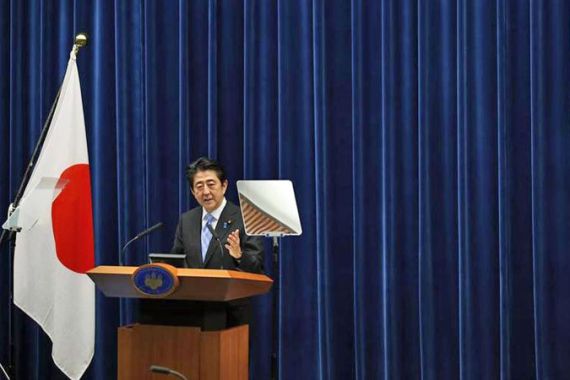Japan’s PM calls snap election
Shinzo Abe calls early poll for December after country falls into recession, as he seeks mandate for economic policies.

Japan’s Prime Minister Shinzo Abe has called a snap election for December, and put off a sales tax hike planned for next year, as he seeks a renewed mandate for his all-or-nothing policies to end two decades of economic stagnation.
Despite his attempts to implement those policies, the Japanese economy slipped into a recession in the last quarter after a sales tax increase in April crushed consumer and business spending.
The recession has forced Abe to delay the second sales hike planned for October next year until April 2017.
Abe said on Tuesday that he will dissolve parliament on Friday and he wants an election as soon as possible, which would be mid-December.
The prime minister hopes to gain support from the electorate for his tax decision and for his overall policies of extreme monetary easing, heavy government spending and economic reforms, which have become known as “Abenomics”.
“I realise this election will be tough, but I need to hear the voice of the people,” Abe told a news conference on Tuesday.
“I will step down if we fail to keep our majority because that would mean our Abenomics is rejected.”
‘Only path’
The government and the Bank of Japan have pumped hundreds of billions of dollars into the economy in the two years since Abe was elected.
The delay in raising the sales tax to ten percent from the current eight percent will slow Japan’s work on repairing its battered public finances, but Abe said the risk to the world’s third-largest economy was a bigger threat.
The prime minister’s ruling Liberal Democrats have a solid majority and hope to further consolidate their power at a time when opposition parties are weak and in disarray.
Abe described his strategies as the “only path” for Japan to escape its economic malaise.
“Some people say Abenomics has failed or it’s not performing well,” he said. “But then what should we be doing?”
The Liberal Democrats have been coaching freshman polticians on campaign strategies and opposition parties have rushed to discuss possible new alliances, as campaign posters went up in some Tokyo neighbuorhoods.
Abe got a rare second term as prime minister after stepping down just a year into his rocky first term in office during 2006-2007. His support ratings started out high as share prices surged in early 2013, but have fallen since then.
Parliament faced a dilemma over campaign finance scandals that led to the resignations of two of his cabinet ministers within weeks of an early September reshuffle.
By dissolving parliament for an election, Abe can clear the slate and once again reshuffle his cabinet, said Michael Cucek, a Tokyo-based analyst and fellow at Temple University Japan.